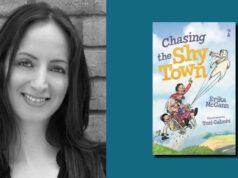Theo Dorgan explains just why it’s impossible to have a favourite book.
ONE OF THE MINOR HAZARDS of bringing out a new book is the phone call or e-mail from some young journalist who’s been tasked with filling space by getting you to answer one of those two-minute brain-dead quizzes—‘What’s your favourite restaurant/holiday destination/piece of music/ play . . . ?’ My immediate instinct is, naturally, to lie through my back teeth. My favourite holiday destination is a favourite in part because I hope to meet nobody I know there; I have no intention of alienating my fellow writers by naming a current book not theirs, nor any of the restaurants in which I sometimes eat by naming someplace else, and so on.
And of course the opportunities for mischief are many— I still cherish the silence on the other end of the phone when some hapless young tyro asked ‘How would you like to die?’ and I answered ‘Unsuccessfully’. All the same, I always hesitate when asked to name a favourite book. What stumps me, inevitably, is the extraordinary idea that you could have one favourite book, one above all others, a single book that answers to all the complex hungers of the helplessly addicted lifelong reader. What also gives me pause is the weight of implication: in the unlikely event that someone is prompted to read a book because I name it here, can I be sure it will prove to be worth their while?
When it comes to asking myself what my favourite book might be, I am always and ever at the mercy of the Library Angel, that inspired and fleeting companion who guides my hand when I roam past my bookshelves, palm towards the serried spines, eyes only half-focused. When the fingers hesitate, bunch and pluck some book from the shelf, I am always slightly surprised and yet not surprised. Ah, I think, that’s what you need to be reading right now.
I usually temporise by asking whether I can preface my answer with ‘my favourite book at this moment is . . .’, but they never let you away with that.
When I was twelve or so my book of the moment was The Wind in the Willows, of which two episodes live always in my mind: Mole’s homecoming, and the dreamy Mediterranean rhapsodies of Ratty’s seafaring cousin. At sixteen I was swept up by Che Guevara’s Reminiscences of the Cuban Revolutionary War, at eighteen by Herman Hesse’s Narziss und Goldmund, and shortly afterwards by everything and anything from the pens of Hugh McDiarmid and Robert Graves—the most unlikely of bedfellows. A truthful answer given at any one moment of my life, however, would have had to be qualified immediately with a disavowal, a list of alternates and alternatives because—and this is true of almost all real readers—I am always caught up in a number of books at any given moment of my life.
I was reading Hesse, but also Greer and de Beauvoir; Guevara, but also pure trash thrillers; Kenneth Grahame, but also W.E. Johns. Like Whitman, like everyone else, I contain multitudes: I am never just one reader, neither does any one book fill my mind and time to the exclusion of all other titles and works. Apart from all else, I am never one person at a given time: all of the selves I have been, am still and might yet be are in there jostling for my attention, speaking in tongues and flashes of pictures, memories and anticipations of taste, touch and smell.
The book you choose at a given moment will always answer to some appetite you had not recognised until that moment, some need that has been building its imperative in your subconscious.
Of course, this only works if your shelves have accumulated over time a breadth, depth and variety of choice, and almost certainly the books you have accumulated will have found their way onto the shelves through happenstance, suggestions and guidance from others, necessity, affinity, a sense of duty to the tradition, perhaps—books beget books, and choice begets further choices. Mind, it is absolutely necessary to leaven the mix with rubbish, light-minded trash, mistakes, sudden misplaced enthusiasms, the random and the embarrassing. The thing is always to remember that the book you hold in your hand right now, the book that has you entirely in its grip, its spell, is the passion of a moment only: if it’s any good it will stay with you, and will shape your mind for the next book that will grip you, as it has been prefigured by all the other books you have read in the past.
Reading, like writing, is a process, and a book is no more than a moment snatched from the flow. To have a favourite, one above and to the exclusion of all others, seems to me absurd, undesirable, impossible.
First published in Books Ireland September/October 2015











